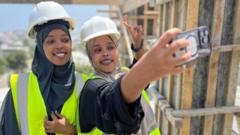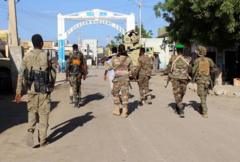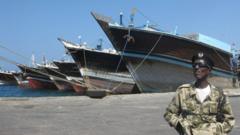As Somalia's capital faces a construction surge, female engineers are stepping into roles traditionally dominated by men, symbolizing both empowerment and the nation's recovery from turmoil. Two remarkable women, Fathi Mohamed Abdi and Saadia Ahmed Omar, are central figures in a transformative 10-story apartment project in Taleh, Mogadishu. Their involvement signifies a shift in a male-dominated industry, with each battling skepticism about women’s roles in engineering.
"When I began, many questioned my capacity due to my gender," recalls 24-year-old Abdi, COO of Arkan Engineering Services. "They'd wonder how they could trust a woman with their investments." Both engineers, Abdi and Omar, age 24, reflect on their journey within a city that has endured decades of civil unrest. "Mogadishu needs our contributions," Omar reflects, highlighting their role in the city's comeback from chaos.
Having witnessed their homeland's degradation, they chose to serve their community rather than flee. Despite recruitment challenges within the field—where only 5% of engineers are women—growing demand for construction professionals has opened doors for these women. Their success is echoed by Ibrahim Abdi Heyle, chairman of the Somali Engineers Association, who indicates that women are crucial in addressing the workforce shortfall.
"Mogadishu has seen over 6,000 new buildings rise in five years," states Salah Hassan Omar from the mayor's office, citing improved security as a catalyst for urban revitalization. Yet this rapid progress brings mixed feelings. Veteran architect Siidow Cabdulle Boolaay criticizes the loss of Mogadishu's rich architectural heritage, warning about the structural integrity given the local sand's high salt content used in construction.
Additional concerns include inadequate regulatory oversight and environmental risks linked to an uncoordinated construction boom, as highlighted by UN advisers. As population densities rise from migration caused by climate change and conflict, urban infrastructure challenges loom, including insufficient sewage systems and groundwater depletion.
Nevertheless, optimism for Mogadishu's future continues to shine. Abdi and Omar, both graduates of Plasma University, have overseen more than 30 multimillion-dollar projects, pushing past gender barriers in a recovering city. They envision a stronger engineering profession and a resilient community, declaring, "We’re not merely constructing buildings; we’re building hope." As optimism endures amidst adversity, Mogadishu's evolution reflects a broader narrative of resilience, hope, and transformation.
"When I began, many questioned my capacity due to my gender," recalls 24-year-old Abdi, COO of Arkan Engineering Services. "They'd wonder how they could trust a woman with their investments." Both engineers, Abdi and Omar, age 24, reflect on their journey within a city that has endured decades of civil unrest. "Mogadishu needs our contributions," Omar reflects, highlighting their role in the city's comeback from chaos.
Having witnessed their homeland's degradation, they chose to serve their community rather than flee. Despite recruitment challenges within the field—where only 5% of engineers are women—growing demand for construction professionals has opened doors for these women. Their success is echoed by Ibrahim Abdi Heyle, chairman of the Somali Engineers Association, who indicates that women are crucial in addressing the workforce shortfall.
"Mogadishu has seen over 6,000 new buildings rise in five years," states Salah Hassan Omar from the mayor's office, citing improved security as a catalyst for urban revitalization. Yet this rapid progress brings mixed feelings. Veteran architect Siidow Cabdulle Boolaay criticizes the loss of Mogadishu's rich architectural heritage, warning about the structural integrity given the local sand's high salt content used in construction.
Additional concerns include inadequate regulatory oversight and environmental risks linked to an uncoordinated construction boom, as highlighted by UN advisers. As population densities rise from migration caused by climate change and conflict, urban infrastructure challenges loom, including insufficient sewage systems and groundwater depletion.
Nevertheless, optimism for Mogadishu's future continues to shine. Abdi and Omar, both graduates of Plasma University, have overseen more than 30 multimillion-dollar projects, pushing past gender barriers in a recovering city. They envision a stronger engineering profession and a resilient community, declaring, "We’re not merely constructing buildings; we’re building hope." As optimism endures amidst adversity, Mogadishu's evolution reflects a broader narrative of resilience, hope, and transformation.




















